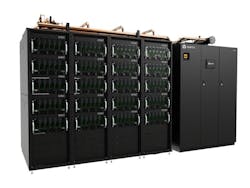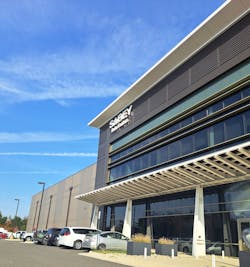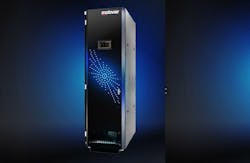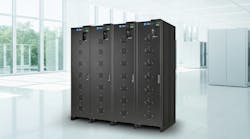Strategic AI Partnerships Ease Liquid Cooling Technology Uptake In High-Density Data Centers
Reading down this week's press mega-announcment for AWS and NVIDIA's Project Ceiba, the companies' new strategic collaboration to offer supercomputing infrastructure, software and services for generative AI, we learn that AWS data center instances with NVIDIA's GH200 NVL32 unit to support the new NVIDIA GH200 (Grace Hopper superchip) cloud systems will be the first AI infrastructure within AWS to feature liquid cooling, the better to ensure densely-packed server racks can efficiently operate at maximum performance.
AWS said forthcoming implementations with the GH200 NVL32 will provide customers on-demand access to supercomputer-class performance, critical for large-scale AI/ML workloads that need to be distributed across multiple nodes for complex generative AI applications. AWS concurrently announced its own AI chip.
“Generative AI is transforming cloud workloads and putting accelerated computing at the foundation of diverse content generation,” said Jensen Huang, founder and CEO of NVIDIA.
Huang emphasized, “Driven by a common mission to deliver cost-effective state-of-the-art generative AI to every customer, NVIDIA and AWS are collaborating across the entire computing stack, spanning AI infrastructure, acceleration libraries, foundation models, to generative AI services.”
So liquid cooling technology is now in the building at AWS data centers. That's good to know, and also indicative of how strategic industry partnerships are spurring increased liquid cooling technology uptake in high-density data centers of both the hyperscale and colocation varieties.
Vertiv LC Technology Heads for Intel
For its part, Vertiv just announced that it will collaborate with Intel Corp. by providing liquid cooling for Intel's Gaudi3 AI accelerators, set to launch in 2024.
"AI is driving the need for innovative and efficient cooling for servers and accelerators, and direct-to-chip cooling is an option for many AI adopters," noted Jan Michael Cruz, Global Analyst Relations at Vertiv.
“The compute required for AI workloads has put a spotlight on performance, cost and energy efficiency as top concerns for enterprises today,” said Dr. Devdatta Kulkarni, principal engineer and lead thermal engineer on this project at Intel. “To support increasing thermal design power and heat flux for next-generation accelerators, Intel has worked with Vertiv and other ecosystem partners to enable an innovative cooling solution that will be critical in helping customers meet critical sustainability goals.”
The Intel Gaudi3 AI accelerator will enable both liquid-cooled and air-cooled servers, supported by Vertiv pumped two-phase (P2P) cooling infrastructure.
The liquid cooled solution has been tested up to 160 kW accelerator power using facility water from 17°C up to 45°C (62.6°F to 113°F). The air-cooled solution has been tested up to 40kW of heat load that can be deployed in warm ambient air data centers up to 35°C (95°F).
Vertiv said the total medium pressure direct P2P refrigerant-based cooling solution will help customers implement heat reuse, warm water cooling, free air cooling and reductions in power usage effectiveness (PUE), water usage effectiveness (WUE) and total cost of ownership (TCO).
“The Intel Gaudi3 AI accelerator provides the perfect solution for a Vertiv and Intel collaboration,” said John Niemann, SVP global thermal line of business at Vertiv. “Vertiv helps customers accelerate the adoption of AI quickly and reliably, while also helping them to achieve sustainability goals.”
Sabey Data Centers, JetCool Explore LC Breakthroughs Together
Earlier this fall, colocation specialist Sabey Data Centers announced a strategic partnership with JetCool Technologies. Aiming to "redefine and enhance sustainable digital infrastructure standards," the collaboration hinges on exploring recent breakthroughs in advanced cooling technologies for high-density chips.
As aptly characterized by Sabey Data Centers, "The escalating prominence of high-performance computing, coupled with the increasing utilization of AI and edge computing, has significantly heightened the critical issue of cooling high-density environments efficiently." In response to such challenges, the patented JetCool liquid cooling technology helps data centers such as Sabey targets chip hot spots with precise microjets, offering what is billed as a transformative approach to data center thermal management.
John Sasser, Chief Technology Officer at Sabey Data Centers, said, “Our commitment to managing our facilities as efficiently and sustainably as possible has always been of paramount importance. Through the integration of JetCool's pioneering self-contained liquid cooling solutions, we are testing a new way to elevate the quality of our services and reinforce our position as frontrunners in the field of eco-friendly data center solutions.”
Sabey reckons the JetCool products stand to reduce capital and operational expenses while ensuring top-tier processing speeds and heightened computing densities without the need for extensive facility modifications. At the time of its announcement in September, the companies said their new partnership signifies a promising future for both organizations as they strive to push the boundaries of sustainability in the data center landscape.
Bernie Malouin, CEO of JetCool, said, "This journey with Sabey will showcase how data centers and colocation can enable their tenants to use less power while deploying the latest chipsets. This collaboration amplifies our collective drive to offer top-tier thermal management solutions to those aiming to optimize their data centers and high-powered computing needs."
This month, JetCool and Sabey published results from their ongoing collaboration in a technical case study. The documented deployment reveals how JetCool's SmartPlate system for direct-to-chip liquid cooling has significantly improved thermal management and reduced energy consumption in Sabey's existing data center set-ups.
Notable early findings from JetCool and Sabey’s partnership include significant realizations in the area of power efficiency. The data showed the SmartPlate System accounting for a 13.5% reduction in power consumption, compared to traditional air-cooled servers.
“As the data center industry transitions to liquid cooling, JetCool’s SmartPlate System will help Sabey to bridge the gap,” said Sabey's Sasser.
In terms of thermal management, the study found the JetCool system achieved a 32% decrease in CPU to inlet temperature differential, leading to lower cooling energy usage.
Sasser continued, “With investments in AI and HPC, more companies are looking for colocation facilities that can support high-density IT deployments. The SmartPlate system is a practical and cost-effective solution that allows Sabey’s customers to deploy higher density servers without the expenses related to a full liquid cooling application, especially in existing air-cooled facilities. As we continue to lead the way in introducing efficient data center solutions, I believe the SmartPlate System will be a great option for us.”
The partners said the published results in the full case study are "just the beginning" for their ongoing collaboration, dedicated to fostering further advancements in efficiency for data center technology.
"Our collaboration with Sabey Data Centers highlights the real-world advantages and scalability of our cooling solutions in a demanding data center environment," added JetCool's CEO Malouin. "It's about providing a scalable, sustainable solution that meets the growing demand for more powerful and efficient data center operations. By delivering enhanced cooling efficiency without the need for extensive infrastructure overhauls, JetCool and Sabey are setting new benchmarks for the industry."
Read the full Sabey Data Centers - JetCool case study here.
Motivair DLC Juices HPC
This month's SC23 show in Denver also saw freshly rebranded direct liquid cooling technology expert Motivair Corp. announce a new strategic partnership with Giga Computing, a subsidiary of parent company GIGABYTE and a provider of servers for the high-performance computing (HPC) sector.
Motivair will be providing its direct liquid cooling technology and global support services for Giga Computing’s CPU and GPU liquid-cooled enabled server platforms.
Motivair Corporation President and CEO Rich Whitmore said, “As a Giga Computing partner, Motivair is committed to providing our direct liquid cooling solutions with GIGABYTE servers and offering global support services to further enable Giga Computing's growth and leadership in the industry. We are proud to be a part of its success and look forward to a long and mutually beneficial relationship.”
Mainly targeting the enterprise computing market, the Giga Computing product portfolio addresses all types of emerging IT workloads, spanning from large data centers to the edge, including traditional HPC and AI to data analytics, 5G, cloud computing, and other applications.
“Motivair has proven to us that it can strengthen our ability to quickly integrate our GIGABYTE hardware with DLC technology in many regions, “said Vincent Wang, Sales VP at Giga Computing. “As part of our liquid cooling initiative, we are building our partner network so that we can make the integration process seamless and with fewer barriers.”
Cutting-Edge Data Center CDU
Climbing up the scale of HPC, this month Motivair also unveiled its newest CDU [Coolant Distribution Unit], the MCDU-30.
Aimed especially at AI workloads and created in collaboration with premier GPU manufacturers, data center and supercomputer operators, the CDU is billed as a cutting-edge data center advancement targeting hyperscale clients and businesses looking to leverage and deploy the latest AI capabilities.
Designed for to seamless integration into large-scale data center infrastructure, the MCDU-30 features a 600 mm wide frame and a depth of 1200 mm.
“This remarkable product not only embodies innovation but is poised to drive innovation itself," asserted Motivair President and CEO, Rich Whitmore. "It will play a pivotal role in advancing the computing capabilities of artificial intelligence and supercomputing, advancing the 4th Industrial Revolution that is re-shaping the world.”
As the most compact floor-mount unit in Motivair’s CDU offering, and the company's newest system, the MCDU-30 supports cooling capacity up to 860 kW.
Additional features include available primary/secondary fluid filtration, water quality monitoring, primary/secondary flow meters, a touchscreen HDMI interface, and enhanced security features including secure boot and restful API, allowing integration into platforms like Redfish.
Motivair’s overall CDU portfolio has seven models, ranging in cooling capacity from 105kW to 2.3 MW.
5 Wasy Liquid Cooling Can Be Integrated Into Sustainability and Climate Goals
Meanwhile, in honor of COP28 (Nov. 28 - Dec. 12), the annual international climate summit convened by the United Nations this year in Dubai, Motivair's latest blog offering highlighted, as directly quoted below, five ways liquid cooling can be integrated into sustainability and climate goals:
- Enhanced Energy Efficiency: "Liquid cooling systems have the potential to be more energy-efficient than traditional air-cooling methods. By effectively dissipating heat from servers, liquid cooling aids overall energy conservation within data centers, aligning with the objective of reducing the carbon footprint associated with their operations."
- Integration with Renewable Energy: "When coupled with renewable energy sources, liquid cooling becomes a tool for improving the sustainability of data centers. The adoption of liquid cooling technology can complement endeavors to power data centers using clean and renewable energy, thereby further decreasing their environmental impact."
- Reduced Water Consumption: "Liquid cooling systems, in comparison to traditional cooling methods, use less water. Given the environmental concerns related to water scarcity, data centers embracing water-efficient liquid cooling systems contribute to sustainable water management practices."
- Contribution to Carbon Neutrality Goals: "Liquid cooling can be an integral component of a comprehensive strategy for data centers to attain carbon neutrality. When combined with renewable energy sources, energy-efficient equipment, and initiatives for carbon offsetting, liquid cooling plays a role in the overall sustainability of data center operations."
- International Collaboration and Standardization: "COP events typically involve discussions on international collaboration and the formulation of standards for sustainable practices. Liquid cooling technologies and best practices can be shared among countries and organizations to establish common standards for environmentally friendly operations in data centers."
The COP28 summit's stated mission is to help the world continue charting a course of action to dramatically reduce emissions and protect the planet. As further reckoned by Motivair:
With the escalating demand for digital services, identifying methods to enhance the energy efficiency and environmental friendliness of data centers is imperative for realizing global climate objectives outlined in conferences like COP28.
The primary aim of COP28 is to evaluate worldwide endeavors to keep the target of limiting global warming to 1.5°C above pre-industrial levels achievable, a commitment established by 195 countries in the Paris Agreement in 2015.
Motivair DLC Technology Featured in TIME Magazine
Finally, it must be noted how Motivair's cooling technology enabled one of TIME Magazine's Best Inventions of 2023, namely Oak Ridge National Laboratory's (ORNL) Frontier supercomputer.
Each year, TIME recognizes 200 extraordinary inventions "that change lives." Frontier was included in TIME's Best Inventions of 2023 list in the ranking's Experimental category.
Hosted at the ORNL in Tennessee, Frontier is known as the world's first and fastest exascale supercomputer.
Surpassing a quintillion calculations per second and computing 5x faster than current competitors, the supercomputer is empowering scientists to pioneer innovations in energy, medicine, and materials.
About the Author
Matt Vincent
A B2B technology journalist and editor with more than two decades of experience, Matt Vincent is Editor in Chief of Data Center Frontier.





